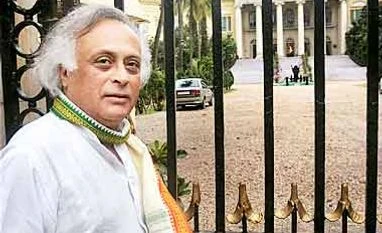The Supreme Court today sought a response from the Centre on a plea by Congress leader Jairam Ramesh challenging the government's decision to treat Aadhaar bill as a money bill and pass it during the budget session last year after rejecting amendments to it by the Rajya Sabha.
A bench comprising Chief Justice Dipak Misra and Justices A M Khanwilkar and D Y Chandrachud issued notice to the Centre and others, and tagged the plea of Ramesh with the clutch of petitions against the Aadhaar scheme itself for hearing by a five-judge Constitution bench on January 17 next year.
Senior advocate and Congress leader Kapil Sibal, who appeared for Ramesh, said the government wrongly decided to term Aadhaar bill as a money bill and the issue needed to be debated and decided by the court.
"Issue notice. As similar matters are listed on January 17, let this matter be listed on the same day," the bench said.
Earlier, the apex court had said that it was "tentatively not convinced" about the grounds cited by the Congress leader to challenge Lok Sabha Speaker's decision to certify a bill to amend Aadhaar law as a money bill.
The observation had come after the government contended that it fulfilled the criteria for certification as money bill as funds for welfare schemes for which the biometric identification number (Aadhaar) was necessary has to be drawn from the Consolidated Fund of India.
The Centre took the stand that the decision of the Speaker cannot be brought under judicial scrutiny.
The Aadhaar (Targeted Delivery of Financial and Other Subsidies, Benefits and Services) Bill, 2016 was discussed and passed by the Lok Sabha on March 11 last year.
It was then taken up in Rajya Sabha on March 16, where several amendments were made to it. The bill was then returned the same evening to Lok Sabha which rejected all amendments proposed by the Upper House and passed it.
A money bill contains provisions for various taxes and appropriation of funds, and can be introduced only in the Lok Sabha. The Rajya Sabha cannot make amendments to such bills after passage by the Lok Sabha. The Rajya Sabha can suggest amendments but it depends on the Lok Sabha to accept or reject them.
The NDA government chose to categorise the bill as a money bill as it lacked a majority in the Rajya Sabha.
A bench comprising Chief Justice Dipak Misra and Justices A M Khanwilkar and D Y Chandrachud issued notice to the Centre and others, and tagged the plea of Ramesh with the clutch of petitions against the Aadhaar scheme itself for hearing by a five-judge Constitution bench on January 17 next year.
Senior advocate and Congress leader Kapil Sibal, who appeared for Ramesh, said the government wrongly decided to term Aadhaar bill as a money bill and the issue needed to be debated and decided by the court.
Also Read
Earlier, the apex court had said that it was "tentatively not convinced" about the grounds cited by the Congress leader to challenge Lok Sabha Speaker's decision to certify a bill to amend Aadhaar law as a money bill.
The observation had come after the government contended that it fulfilled the criteria for certification as money bill as funds for welfare schemes for which the biometric identification number (Aadhaar) was necessary has to be drawn from the Consolidated Fund of India.
The Centre took the stand that the decision of the Speaker cannot be brought under judicial scrutiny.
The Aadhaar (Targeted Delivery of Financial and Other Subsidies, Benefits and Services) Bill, 2016 was discussed and passed by the Lok Sabha on March 11 last year.
It was then taken up in Rajya Sabha on March 16, where several amendments were made to it. The bill was then returned the same evening to Lok Sabha which rejected all amendments proposed by the Upper House and passed it.
A money bill contains provisions for various taxes and appropriation of funds, and can be introduced only in the Lok Sabha. The Rajya Sabha cannot make amendments to such bills after passage by the Lok Sabha. The Rajya Sabha can suggest amendments but it depends on the Lok Sabha to accept or reject them.
The NDA government chose to categorise the bill as a money bill as it lacked a majority in the Rajya Sabha.
)